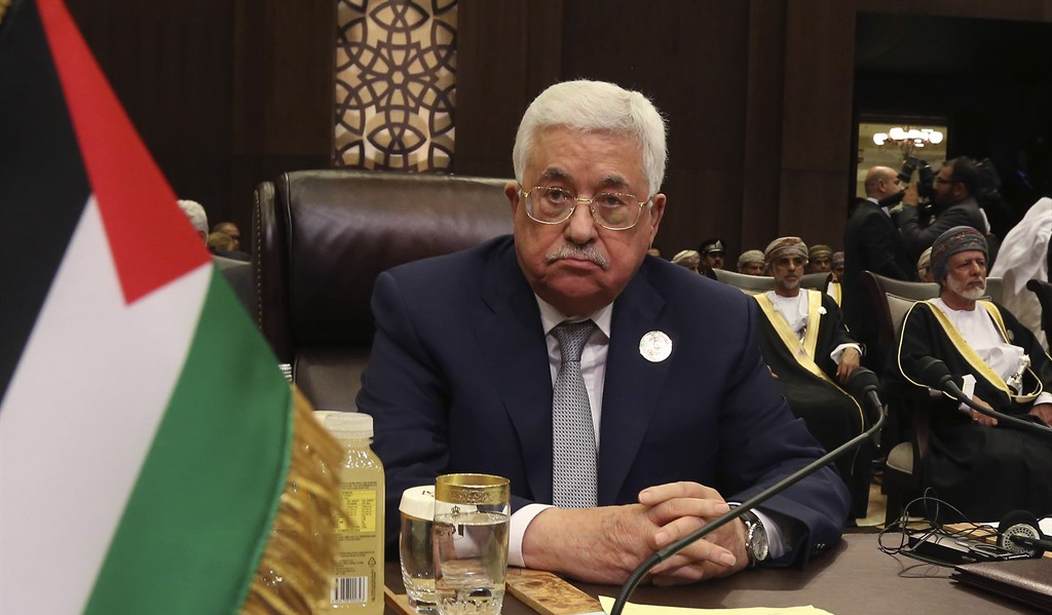Wasn’t Barack Obama supposed to be “the one”? How did that work out? Mahmoud Abbas will spend all day at the White House meeting with Donald Trump, hoping to get the US to put pressure on Israel for more concessions for peace talks. That might be a tough sell; two months ago, when Trump met with Benjamin Netanyahu, the president backed away from the two-state solution, at which Palestinians cried foul.
Now, however, they seem oddly optimistic about getting Trump on their side. Politico’s Bryan Bender spent some time in Ramallah, and reports that some there think Trump may just be “the one.” Er … again:
“The hints are very positive,” General Jibril Rajoub, a member of the central committee of Fatah, the moderate wing of the Palestinian leadership, told me over lunch in late April in a trendy restaurant, Caspar and Gambini’s, on Ramallah’s Al Jihad Street.
A senior Palestinian official, in one of a series of interviews with POLITICO Magazine, put it this way: “He might be the one to bring the political settlement.”
It is a sense of optimism that virtually no one here anticipated—and one that feels genuine, if also calculated to get into the good graces of the new American leader. Trump’s personal chemistry with hawkish Israeli Prime Minister Benjamin Netanyahu and the pro-settler views of his new ambassador to Israel, David Friedman, were both seen as early omens that the new American president would have little, if any, interest in the Palestinian issue and might even encourage more Israeli settlement construction in the West Bank.
But Rajoub, an urbane diplomat who runs the Palestinian Football Federation and was a longtime adviser to the late Palestinian leader Yasser Arafat, said the quiet but seemingly earnest visits to Ramallah in recent months of CIA Director Mike Pompeo and Jason Greenblatt, the New York lawyer serving as a Trump envoy, were surprisingly positive.
This might just be the optimism of new opportunities. Obama was supposedly “the one,” and came into office a lot friendlier to the Palestinians than previous presidents. He antagonized Netanyahu, who still managed to outlast Obama, and demanded concessions that initially delighted the Palestinians. That didn’t work out so well for them, in part because Obama ended up alienating Israelis, and in part because Hamas decided to declare war on Israel and wound up getting Gaza demolished, reminding everyone what happened the last time Israel withdrew from occupied territory. If vinegar doesn’t work, though, perhaps honey will — or at least that’s the option in front of the Palestinians and Abbas at the moment.
Bender writes that Abbas will tell Trump that extremism exists in the territories because no “political horizon” has emerged on an agreement. Perhaps that’s a fair issue, but that may be in large part because Palestinians still refuse to accept the existence of Israel as a permanent end point, and they continue to teach extremism to children in their schools. Abbas will be looking to leverage Trump’s close friendship with Netanyahu to the same ends that he tried leveraging Obama’s strained relationship with Netanyahu — to get more concessions that will strengthen Abbas’ position at home without forcing him to deal with the reality that Israel will remain in place, and that the “right of return” is a pipe dream.
Will it work? Probably not, but Trump has begun to earn a reputation for being open to the point of malleability to the most recent visitor. Also, Trump wants to carve out a legacy for himself as the greatest dealmaker in history, and what better way to cement that position than with a settlement of the Israeli-Palestinian question? Unfortunately for all involved, the biggest obstacle to a settlement is Abbas and the Palestinians, and their insistence on keeping the door open to the destruction of Israel. Unless Abbas is coming with some concessions of his own, Palestinians are looking in the wrong direction for “the one.”
Still, Abbas will likely get a decent shot to make his case, and will be on hand through a dinner at the White House among religious leaders tonight. The atmosphere will be somewhat chillier than Netanyahu’s visit in February, Mark Knoller noted:
Pres Trump and @netanyahu had a joint news conference in Feb. Today, Pres Trump and Abbas are only scheduled to make statements.
— Mark Knoller (@markknoller) May 3, 2017
That’s one clear signal that while the Palestinians may or may not be optimistic about this visit, the Trump administration clearly is not.








Join the conversation as a VIP Member